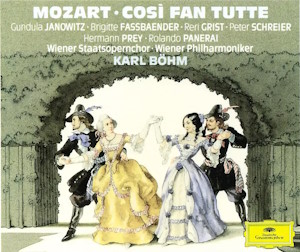
Wolfgang Amadeus Mozart (1756–1791)
Così fan tutte (1790)
Fiordiligi – Gundula Janowitz (soprano)
Dorabella – Brigitte Fassbaender (soprano)
Despina – Reri Grist (soprano)
Ferrando – Peter Schreier (tenor)
Guglielmo – Hermann Prey (baritone)
Alfonso – Rolando Panerai (baritone)
Vienna State Opera Chorus
Vienna Philharmonic Orchestra/Karl Böhm
rec. live, 28 August 1974, Kleines Festspielhaus, Salzburg
Deutsche Grammophon 4298742 [2 CDs: 153]
I think that one of the most unique birthday gifts that I know of occurred in 1974 when Deutsche Grammophon presented Karl Böhm with a complete live recording session for Così fan Tutte on the occasion of his 80th birthday (he just happened to be conducting the opera at the Salzburg Festival on the actual date). The fact that it happened at all is likely due to considerable planning on the parts of the recording company and the festival administration. The resultant recording, while far from perfect, has managed to linger on in the catalogue for 50 years now, and continues to survive as a digital download.
There are a couple of reasons which prevent this set from being a top contender among the many recordings of Così . In the first place the staging by Günther Rennert had been around the Festival since 1972, a time when performances of Così tended to favour a heavily cut version ( i.e. Ferrando loses two arias, and Dorabella and Guglielmo each lose one). Also the fact that it was recorded from a single live performance, without benefit of other sessions made during the run, or retake sessions later, means that there are a few areas where the ensemble is not sufficiently together which could not be fixed. Although they are usually only momentary, they do tend to stand out while one is listening. Still there is a real excitement in the air on these CDs. In the original booklet that accompanied the 1974 vinyl release Rennert discussed his production, and his collaboration with Böhm at length. He mentioned that his direction tried to bring out a gently exaggerated, comedic side to the emotional situation of each of the characters. That seems to have worked its way into the spirit of this performance which is always lively, especially in the recitatives. This doesn’t mean that the more intimate side of the characters lack feeling, but moody seriousness does not overwhelm things here.
Böhm’s leadership is very alive to the nuances in Mozart’s comedy. His real asset was that he never hurried the score. His tempi are more measured but they remain taut and well-sprung. Orchestral details emerge as more sharply defined when the pace is not too frantic. The Vienna Philharmonic had a deep respect for Karl Böhm and it shows in their playing for this Birthday celebration. There are very few detectable errors in the orchestral playing.
Where the recording tends to fall down is in the vocalists not always being quite together in the large scale ensembles. There is one especially noticeable flaw at the climax of “Per Pieta” when Gundula Janowitz runs out of breath during the final run and doesn’t manage to grab onto the climactic high note. This is unfortunate because the rest of her performance is a sheer delight; her cool, floating timbre suits the reserved nature of Fiordiligi perfectly. “Come Scoglio” is sung with confidence and a forthright attitude. There is excellent contrast with Brigitte Fassbaender as her sister; Fassbaender’s tone is full of sap and conveys a sense of earthy playfulness about Dorabella. Some might think her approach is too raucous but over the years I have come to value her vivid style of singing. No one could accuse her of giving a pallid performance. It is too bad that she loses the chance to sing “Èamore un ladroncello”.
Peter Schreier’s elegant phrasing and honeyed tone are an asset as Ferrando. He displays wonderful breath control while singing “Un’aura amorosa”, although once or twice a top note will turn a little hard-sounding; this is something that could easily have been corrected under proper recording studio conditions. The virile sound of Hermann Prey has long been a favorite of mine. Here he sings Guglielmo with pungency and he doesn’t overdo the hostility/ anger of the role. The staging often seems to have placed him at a disadvantaged spot for the microphones to pick his voice up sufficiently. His voice registers more clearly in his arias and recitatives than he does in some of the ensembles.
As the two schemers we have equally dynamic performances from Reri Grist and Rolando Panerai. Grist performs Despina in the candy-coated manner that was common during the 1950s and 60s. Her tone is brilliant and clear, while her bright delivery of the recitatives is a joy to encounter. Don Alfonso can often sound like a grumpy wet blanket, but not when Panerai is singing the role. His vibrant Italianate tone really makes its mark on this recording, despite one or two occasions where his pitch drags a bit.
The sound is fairly decent for a live recording made at Salzburg. The orchestral image is beautifully conveyed, although the voices will occasionally go in and out of focus as they move about on stage. Bumps and thumps do happen but not all that often. There is some brief clinking of glassware and other tiny details related to the staging. I noticed only one cough during the entire opera, and applause is included but only at the ends of both Acts; it is deservedly enthusiastic.
To sum up, there are flaws to be sure but the lively atmosphere more than makes up for these. Most people will want to hear the earlier, more complete (and more perfect) Böhm set on EMI/Warner but there is an aura of the festive about this set, not to mention some gorgeous singing that keeps this Cosi consistently interesting and well-worth the price of acquiring it.
Mike Parr
Buying this recording via a link below generates revenue for MWI, which helps the site remain free


















